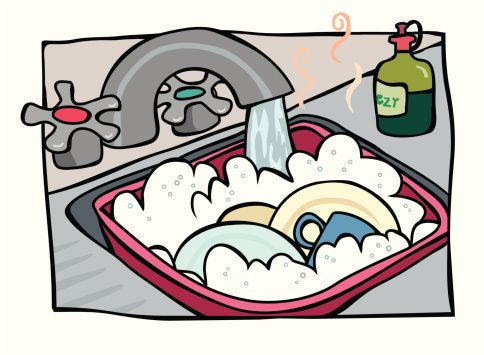LANGUAGE FOCUS
Nội dung lý thuyết
Các phiên bản khácUnit 2: DAYS
LANGUAGE FOCUS
Present simple: affirmative and negative
I can use the present simple to talk about routines.
Present simple: affirmative
1. Compare the sentences. Then match a - d with Spelling Rules 1 - 4.
So sánh các câu. Sau đó, nối các câu từ a đến d với các ý từ 1 đến 4 trong phần "Spelling Rules".
a. I study a lot. / Her older daughter studies hard. (Mình học rất nhiều. / Con gái lớn của cô ấy học hành chăm chỉ.)
b. We have breakfast at 7.30 a.m. / He has breakfast at 5.30 a.m. (Chúng mình ăn sáng lúc 7h30 sáng. / Anh ấy ăn sáng lúc 5h30 sáng.)
c. My brother and I go to school. / He goes to work. (Mình và anh trai đi học. / Anh ấy đi làm.)
d. I get up at 7 a.m. / Noel gets up at 4.45 a.m. (Mình thức dậy lúc 7 giờ sáng / Noel dậy lúc 4 giờ 45 sáng.)
SPELLING RULES |
We use the present simple when we talk about facts and routines. The verbs for he, she and it end differently: (Chúng ta sử dụng thì hiện tại đơn khi chúng ta nói về các sự thật và thói quen. Các động từ sử dụng với "he", "she" và "it" kết thúc khác nhau:) 1. We add - s to most verbs: play → plays. (Chúng ta thêm - s vào hầu hết các động từ: play → plays.) 2. We add - es when a verb ends with - o, - ch, - s, - sh, x or - z. (Chúng ta thêm - es khi một động từ kết thúc bằng - o, - ch, - s, - sh, x hoặc - z.) 3. We remove - y and add - ies when a verb ends with a consonant + y. (Chúng ta bỏ - y và thêm - ies khi động từ kết thúc bằng phụ âm + y.) 4. We use has instead of have. (Chúng ta sử dụng "has" thay vì "have".) |
Hướng dẫn:
1 - d | 2 - c | 3 - a | 4 - b |
2. Choose the correct verbs.
Chọn các động từ đúng.
1. You go / goes to bed at 9.30 p.m.
2. My parents relaxes / relax in the evening.
3. My teacher speaks / speak four languages.
4. Our English class finish / finishes at 3p.m.
5. I has / have lunch at home.
6. My sister studies / study at the weekend.
Hướng dẫn:
1. You go to bed at 9.30 p.m. (Bạn đi ngủ lúc 9h30 tối.)
2. My parents relax in the evening. (Bố mẹ mình nghỉ ngơi vào buổi tối.)
3. My teacher speaks four languages. (Giáo viên của mình nói được bốn thứ tiếng.)
4. Our English class finishes at 3p.m. (Lớp học tiếng Anh của chúng ta kết thúc lúc 3 giờ chiều.)
5. I have lunch at home. (Mình ăn trưa ở nhà.)
6. My sister studies at the weekend. (Chị gái mình học vào cuối tuần.)
3. PRONUNCIATION: Third person - s
Listen to the third person form of the verbs and repeat. Which verbs end with an /ɪz/ sound?
Nghe dạng ngôi thứ ba của các động từ và nhắc lại. Những động từ nào kết thúc bằng âm / ɪz /?
Now indicate the word whose bold part differs from the other three in pronunciation.
Bây giờ hãy chỉ ra từ có phần in đậm phát âm khác với ba từ còn lại.
1 a. relaxes | b. finishes | c. studies | d. boxes |
2 a. goes | b. does | c. watches | d. toes |
3 a. aches | b. watches | c. beaches | d. matches |
4 a. washes | b. wishes | c. makes | d. witches |
5 a. takes | b. makes | c. aches | d. watches |
Hướng dẫn:
1. c | 2. c | 3. a | 4. c | 5. d |
1 a. relaxes /iz/ | b. finishes /iz/ | c. studies /z/ | d. boxes /iz/ |
2 a. goes /z/ | b. does /z/ | c. watches /iz/ | d. toes /z/ |
3 a. aches /s/ | b. watches /iz/ | c. beaches /iz/ | d. matches /iz/ |
4 a. washes /iz/ | b. wishes /iz/ | c. makes /s/ | d. witches /iz/ |
5 a. takes /s/ | b. makes /s/ | c. aches /s/ | d. watches /iz/ |
Present simple: negative
4. Complete the examples from the text on page 26. Then choose the correct words in Rules 1 - 3.
Hoàn thành các ví dụ từ đoạn văn ở trang 26. Sau đó chọn các từ đúng cho các ý từ 1 đến 3 trong phần Rules.
1. The younger children _______.
2. Sue _______ TV a lot.
3. The Radfords _______ usually _______ to restaurants.
Hướng dẫn:
1. The younger children don't help. (Những đứa trẻ nhỏ hơn không giúp đỡ.)
2. Sue doesn't watch TV a lot. (Sue không xem TV nhiều.)
3. The Radfords don't usually go to restaurants. (Gia đình Radfords không thường xuyên đến nhà hàng.)
| RULES |
1. We use don't / doesn't after he, she and it to make negative sentences. 2. We use don't / doesn't after I, you, we and they to make negative sentences. 3. In negative sentences, the main verb sometimes / never ends with an - s. |
Hướng dẫn:
| RULES |
1. We use doesn't after he, she and it to make negative sentences. (Chúng ta sử dụng "doesn't" sau "he", "she" và "it" để tạo câu phủ định.) 2. We use don't after I, you, we and they to make negative sentences. (Chúng ta sử dụng "don't" sau "he", "she" và "it" để tạo câu phủ định.) 3. In negative sentences, the main verb never ends with an - s. (Trong câu phủ định, động từ chính không bao giờ kết thúc bằng - s.) |
5. Look at the information in the table. Write affirmative and negative sentences about the people.
Nhìn vào thông tin trong bảng. Viết những câu khẳng định và phủ định về người.
| Tom | Vicky | Mina |
| ✔ | ✘ | ✔ |
| ✔ | ✘ | ✔ |
| ✔ | ✔ | ✘ |
| ✘ | ✘ | ✔ |
| ✘ | ✔ | ✘ |
Hướng dẫn:
Tom and Mina wash the dishes. (Tom và Mina rửa bát.)
Vicky doesn't wash the dishes. (Vicky không rửa bát.)
Tom and Mina wash the car. (Tom và Mina rửa xe.)
Vicky doesn't wash the car. (Vicky không rửa xe.)
Tom and Vicky sit on sofa a lot. (Tom và Vicky ngồi trên ghế sofa rất nhiều.)
Mina doesn't sit on sofa a lot. (Mina không ngồi trên ghế sofa nhiều.)
Tom and Vicky make breakfast. (Tom và Vicky nấu bữa sáng.)
Mina doesn't make breakfast. (Mina không nấu bữa sáng.)
Tom and Mina don't watch TV a lot. (Tom và Mina không xem TV nhiều.)
Vicky watches TV a lot. (Vicky xem TV rất nhiều.)
6. USE IT! Work in pairs. What does each person in your family do at home? Tell your partner. Use some of the verbs from pages 24 - 25 and exercise 5 (page 25) with adverbs of frequency.
Làm việc theo cặp. Mỗi người trong gia đình bạn làm gì ở nhà? Nói với bạn cùng nhóm. Sử dụng một số động từ trang 24 - 25 và bài tập 5 (trang 25) với trạng từ chỉ tần suất.
Example:
My brother often gets up late. He doesn't help with the housework a lot, but he sometimes washes the dishes. (Anh trai mình thường dậy muộn. Anh ấy không làm việc nhà nhiều, nhưng thỉnh thoảng anh ấy rửa bát.)
Finished?
Write five true sentences about your partner.
Viết năm câu đúng về bạn cùng nhóm của bạn.
Example:
Long's brother often gets up late. He doesn't help with the housework a lot, but he sometimes washes the dishes. He doesn't usually watch TV in his free time. He doesn't play computer games, either. He just loves chatting with his friends.
(Anh trai Long thường xuyên dậy muộn. Anh ấy không làm việc nhà nhiều, nhưng thỉnh thoảng anh ấy rửa bát. Anh ấy không hay xem ti vi vào thời gian rảnh. Anh ấy cũng chẳng chơi trò chơi điện tử. Anh ấy chỉ thích được trò chuyện cùng bạn bè.)
 wash the dishes
wash the dishes wash the car
wash the car sit on the sofa a lot
sit on the sofa a lot make breakfast
make breakfast watch TV a lot
watch TV a lot